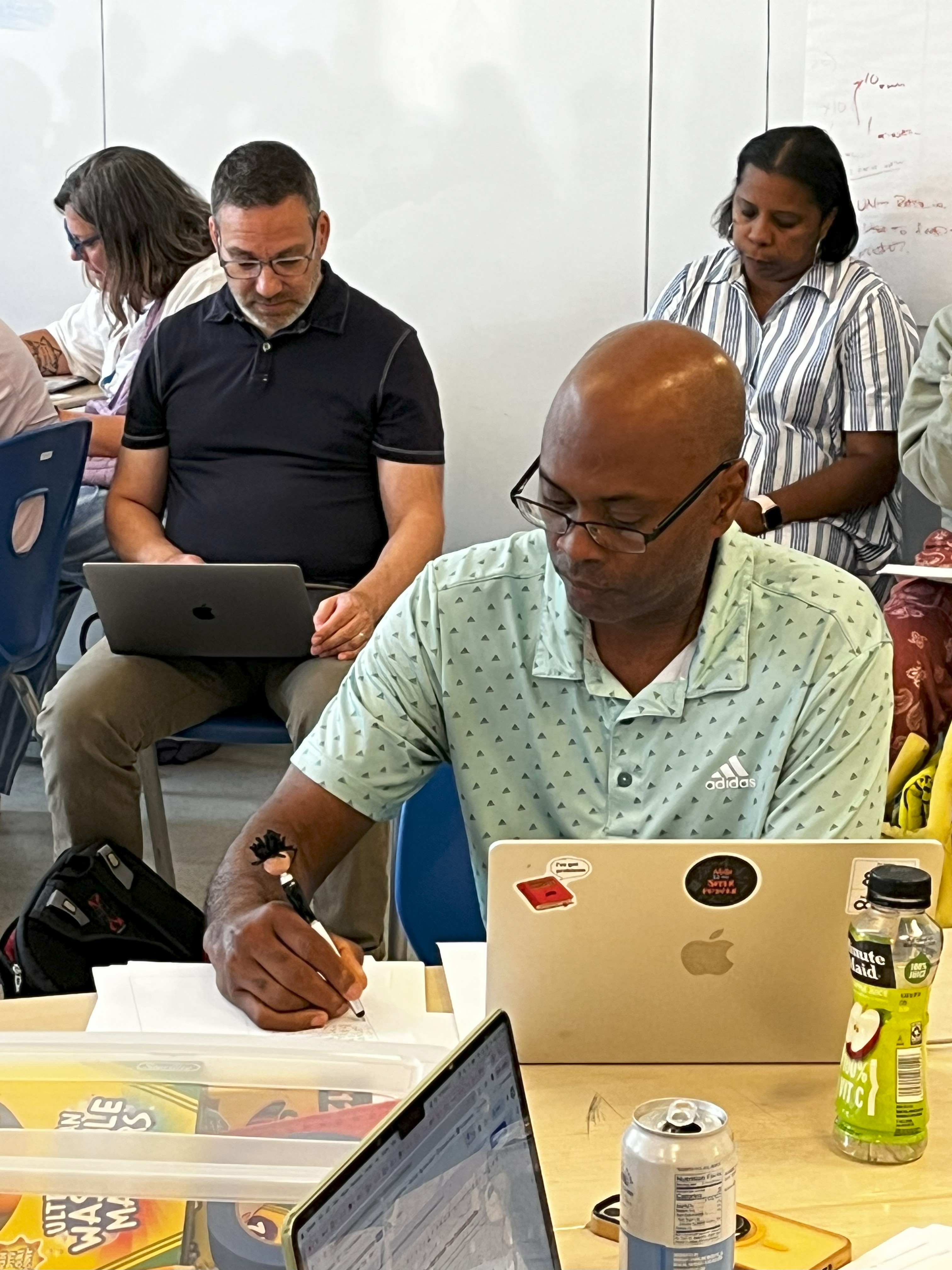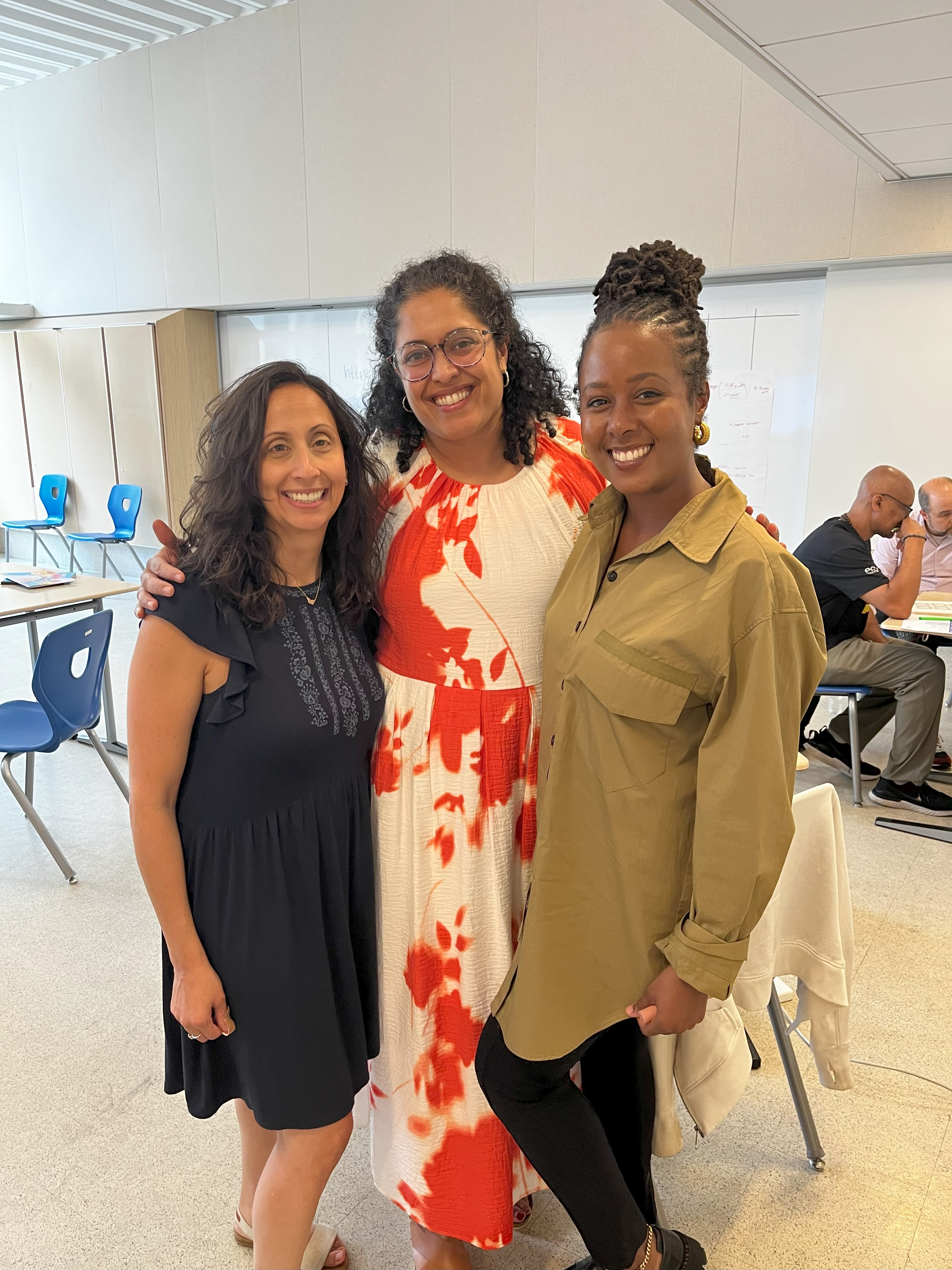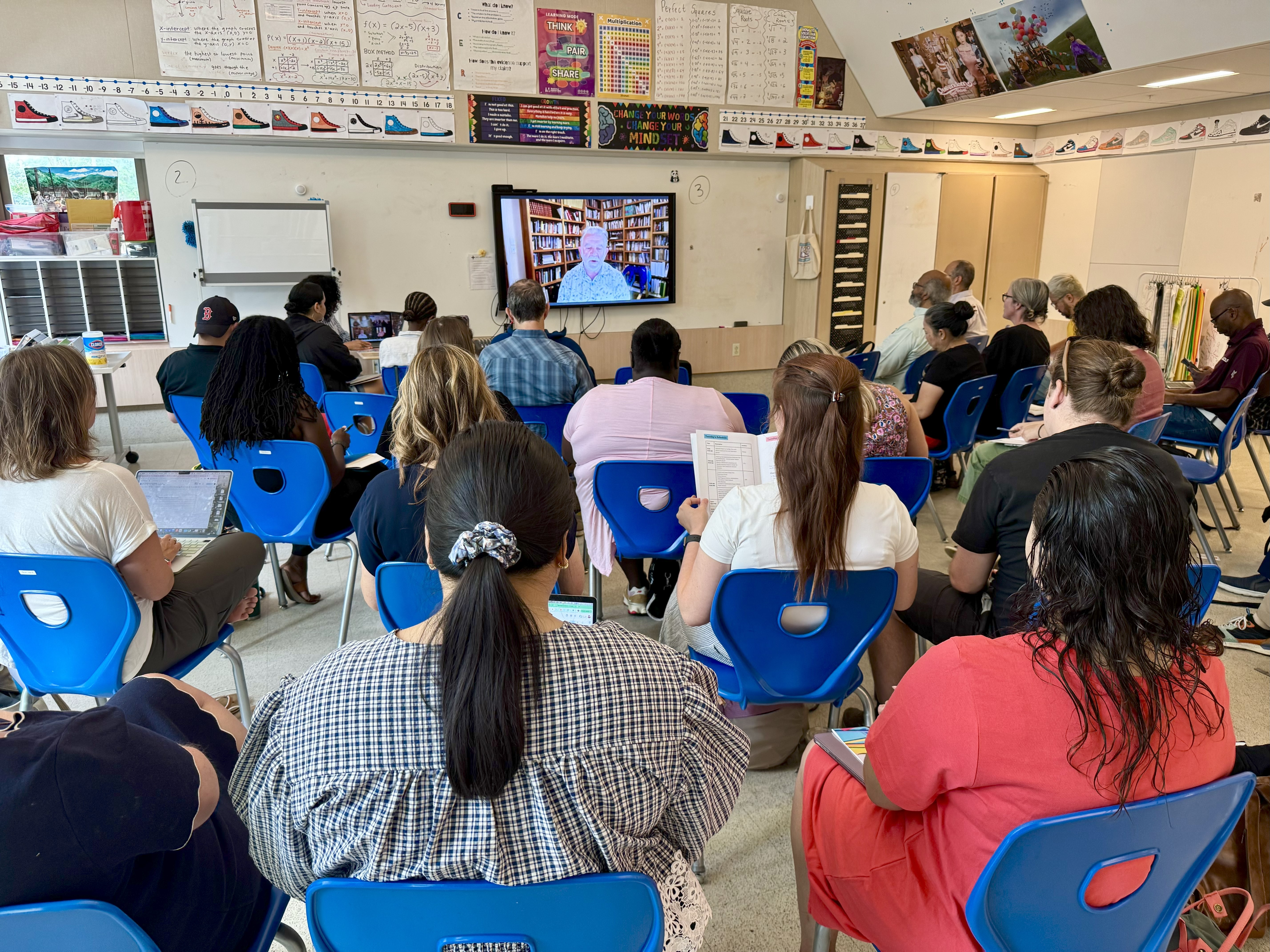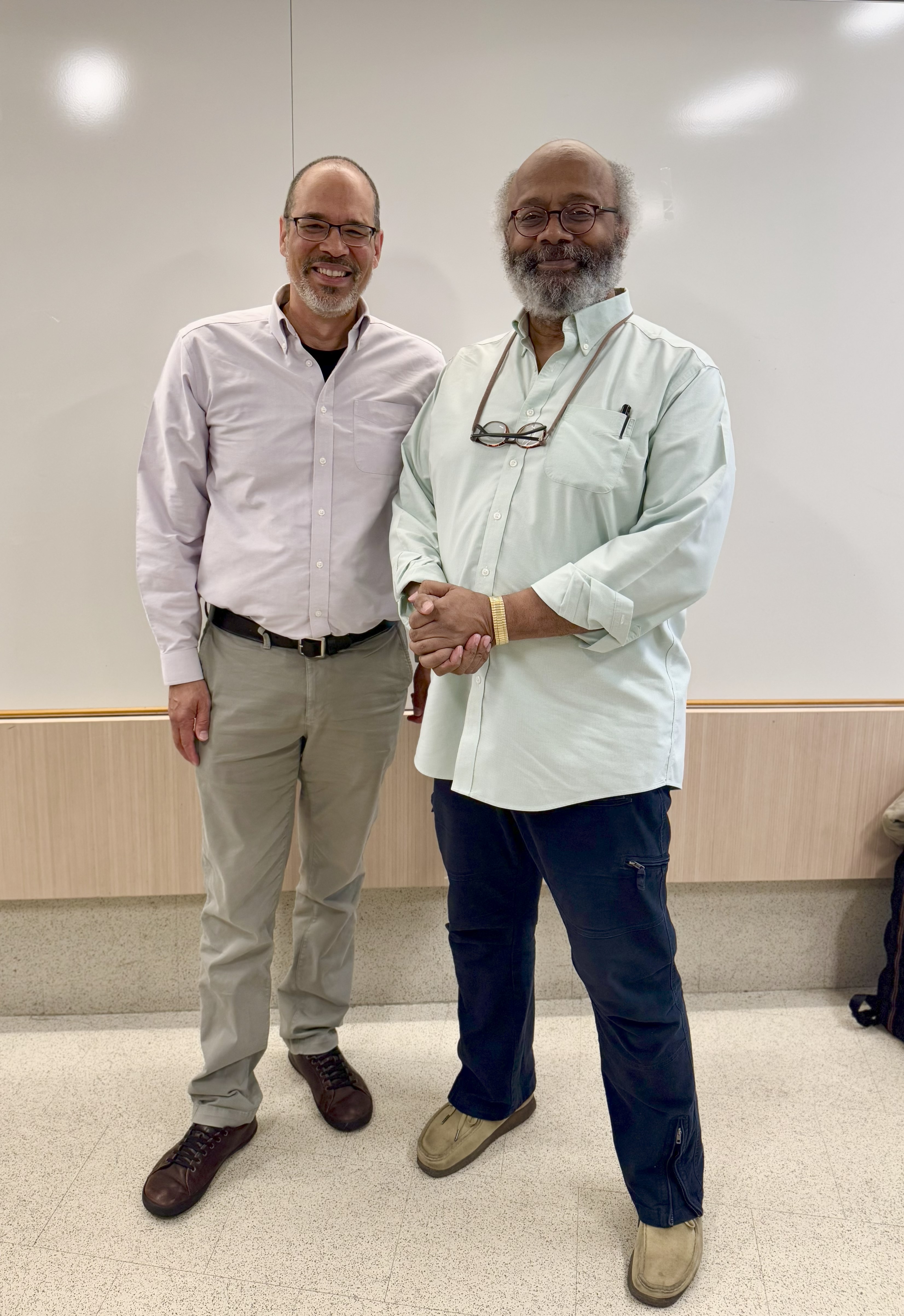Research & Insights / EdVestors Math Learning Communities Summer Institute 2025 Recap
EdVestors Math Learning Communities Summer Institute 2025 Recap
EdVestors Math Learning Communities Summer Institute 2025 Recap
The 2025 EdVestors Summer Institute brought together Mathematics Learning Community (MLC) teams from ten BPS schools to deepen collaboration, strengthen instructional practice, and plan for the year ahead. Teams worked in cross-school groups to address a shared problem of practice and define collaboration strategies. Our cross-school teams are: Dearborn–Holland Tech, English–Madison Park–TechBoston, Mather–Mason, Mendell, and BATA–BATA East Campus.
Over the course of the week, we welcomed 47 mathematics educators from diverse school settings, who collectively engaged in nearly 400 hours of professional development focused on High-Quality Instructional Materials (HQIM). These educators brought a wealth of experience and strong mathematical mindsets to address a central question: What are the key differences between knowing mathematics and knowing how to implement HQIM?
Prior to the Institute, educators demonstrated solid mathematical content knowledge, rating themselves an average of 7.33 out of 10 in initial self-assessments. However, when asked about their confidence in implementing HQIM, the average dropped to 6.36—a gap that, while seemingly small, highlights a core challenge in mathematics education. Even those with strong mathematical backgrounds expressed uncertainty around curriculum implementation.

Monday: Setting the Vision
The first day of the Institute focused on establishing a shared vision for the week. We wanted to center teacher and school leader learning of mathematics, build skills for implementing math curriculum with fidelity and integrity, and promote a disposition of honesty and vulnerability in learning in community. Dr. Bill McCallum, former President and CEO of Illustrative Math, delivered the keynote. A panel discussion followed, featuring Benjamin Moynihan and Bill Crombie of the Algebra Project, as well as Linda Ruiz Davenport, former Mathematics Academic Director for BPS.
Tuesday: Deepening Practice
Tuesday centered on content and practice. The day began with participants learning skills in role-specific groups and concluded with school teams coming together to put their learning into practice. Coaches and school leaders explored coaching strategies using indicators from the Illustrative Math implementation reflection tool. Through video analysis and dialogue, they practiced giving feedback and received one-on-one coaching from Samantha Booth, Director, Mathematics Teaching and Teacher Learning Program at the Center for Education Policy Research at Harvard University.
Meanwhile, teachers split into two grade-level groups: elementary educators worked with BPS Math Directors Stacey Solomon and Glen Sherman, and secondary educators collaborated with Attuned’s Melika Butcher. Teachers unpacked lessons and prepared short demonstrations for components of lessons intended to take place this fall. In the afternoon, school teams—principals, coaches, and teachers—practiced teaching with their colleagues as students and received authentic coaching from their administrators. The most powerful moments occurred during debriefs, where educators openly reflected on what worked.
-
Teacher: “What resonated most with me was EdVestors’ commitment to empowering teachers by coaching evaluators and providing a practice space for us together. My administrator was open about sharing his learning and goals, and this allowed us to build a more trusting relationship which I know will impact our work in the upcoming school year.”
-
Math Coach: “I truly appreciated the time to unpack the IM Implementation rubric and use it to support coaching. I am definitely using this! I also appreciate the time we had to work with colleagues from our own schools for an extended period of time on math.”
-
School Leader: “Focusing on one or two indicators from the rubric for both the teachers practicing lesson enactment and coaches and leaders practicing coaching allowed us to give targeted feedback, which will better support everyone’s learning. I am excited to bring this model back to more content teams.”

Wednesday: Planning and Content Deep Dives
Elementary and secondary groups alternated between lesson and unit planning and grade-level content deep dives. Teachers shared that these sessions made lesson planning more accessible—deep content knowledge enabled them to design lessons with greater fidelity to the curriculum.
Pre-institute survey data revealed that educators prioritize student-centered approaches in lesson planning, with a focus on access, engagement, and differentiation. One educator explained, “Each lesson should have a launch, at least one main activity, and an exit ticket to assess students’ understanding,” demonstrating thoughtful planning aligned with HQIM principles. Educators need hands-on experience with how HQIM translates into daily practice. Survey data on familiarity with the 12 instructional routines from Illustrative Math revealed three groups:

This data tells us that there are a significant number of skilled educators who have some knowledge about the instructional routines but could use additional support to deepen their skills. Additional practice and increased familiarity, which builds “muscle memory” for routines, can lead to greater confidence in implementation. Knowing that strong implementation of learning routines is essential to successful curriculum implementation, we offered a full afternoon practice session on routines. CiCi Yu—a teacher and doctoral student at BU—led a session modeling and debriefing instructional routines from the Illustrative Math curriculum. One teacher reflected:
“It was so great to see educators effectively model and engage us in practices we can use immediately when we return to our classrooms.
Since the summer institute, several participants have reached out to share how impactful the routines session was, and have requested additional sessions to continue to build their skills in using routines.

Thursday: Choice and Leadership
Differentiation was a key design principle of the Institute. On Thursday, participants chose from three sessions based on their interests: a playful coding workshop with robots, an informational session on Mendell Elementary’s “Plan and Dine” model, and a strategy-focused session on supporting diverse learners. Notably, two facilitators were current Math Leads from within our cohort, representing an exciting step in teacher leadership development and community building. The day concluded with time to focus on MLC logistics, including frameworks, data plans, and classroom visit calendars.
Friday: Consolidating and Celebrating
The final day of the Institute was dedicated to reflection, synthesis, and celebration. Educators created posters as tangible artifacts of their learning—capturing insights, strategies, and commitments to bring back to their schools. A four corners activity sparked rich dialogue about the deeper truths of curriculum implementation, revealing how profoundly teacher beliefs shape the success of HQIM. As one participant noted, “It’s not just about what’s in the curriculum—it’s about what we believe students are capable of.” To close the week, we celebrated our collective growth with a joyful community art project: each educator decorated a puzzle piece representing their personal connection to mathematics, and together we assembled a vibrant mosaic of shared purpose and joy.

A Cohort Poised for Impact
Throughout the week, the Institute reinforced the MLC’s theory of action: that co-designed, equity-driven professional learning strengthens math instruction, deepens student engagement, and can improve outcomes for both educators and learners. We are proud of everyone who participated and helped to make the Summer Institute a success!
We are looking ahead to the year with excitement and hope for what is to come. This cohort already brings notable strengths to the adoption of HQIM. Their average mathematical mindset score, which measures dispositions towards learning and doing math, was 4.15 out of 5, reflecting strong beliefs in growth and learning. Job satisfaction averaged 4.26 out of 5—an encouraging sign of openness to change and investment in professional growth, both of which are essential for successful HQIM implementation. With the support of a strong community of educators through the Math Learning Communities, we are confident that our teachers will deepen their content knowledge and strengthen their teaching practices in the year ahead.



